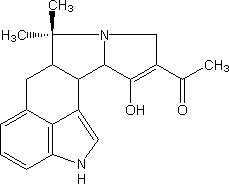ID 2: 71
Toxin: y
Trivial name:
9H-Pyrrolo[1′,2′:2,3]isoindolo[4,5,6-cd]indol-9-one, 10-acetyl-2,6,6a,7,11a,11b-hexahydro-11-hydroxy-7,7-dimethyl-, (6aα,11aβ,11bα)- (8CI); Cyclopiazonic acid; NSC 117181; α-Cyclopiazonic acid
Systematic name:
9H-Pyrrolo[1′,2′:2,3]isoindolo[4,5,6-cd]indol-9-one, 10-acetyl-2,6,6a,7,11a,11b-hexahydro-11-hydroxy-7,7-dimethyl-, (6aR,11aS,11bR)-rel-
Molecular formulae:
C20H20N2O3
Molecular weight: 336.39
Chemical abstract number: 18172-33-3
Chemical type: Alkaloid
Literature reference:
References URL:
Aspergillus Species known to produce this metabolite:
Toxicity:
Tremorgenic toxin. Causes degenerative changes in the liver, kidney and other organs. Intraperitoneal LD50 in the rat 2.3 mg/kg body-weight and oral LD50 of the sodium salt of cyclopiazonic acid is reported to be 19 mg/kg body-weight.
Structure image:

Date uploaded: 2007-09-25 14:42:26
Mycotoxin & Metabolites
-
Metabolite
Produced by (species)
Molecular weight
References
-
399.0
428.5
445.5
443.5
321.5
138.1
264.3
138.1
182.2
Mycotoxin & Metabolite database
Aspergillus species produce a large number of secondary metabolites, sometimes referred to as extrolites. We attempt to list them all here and we also collect published papers.
Search Metabolite papers here
